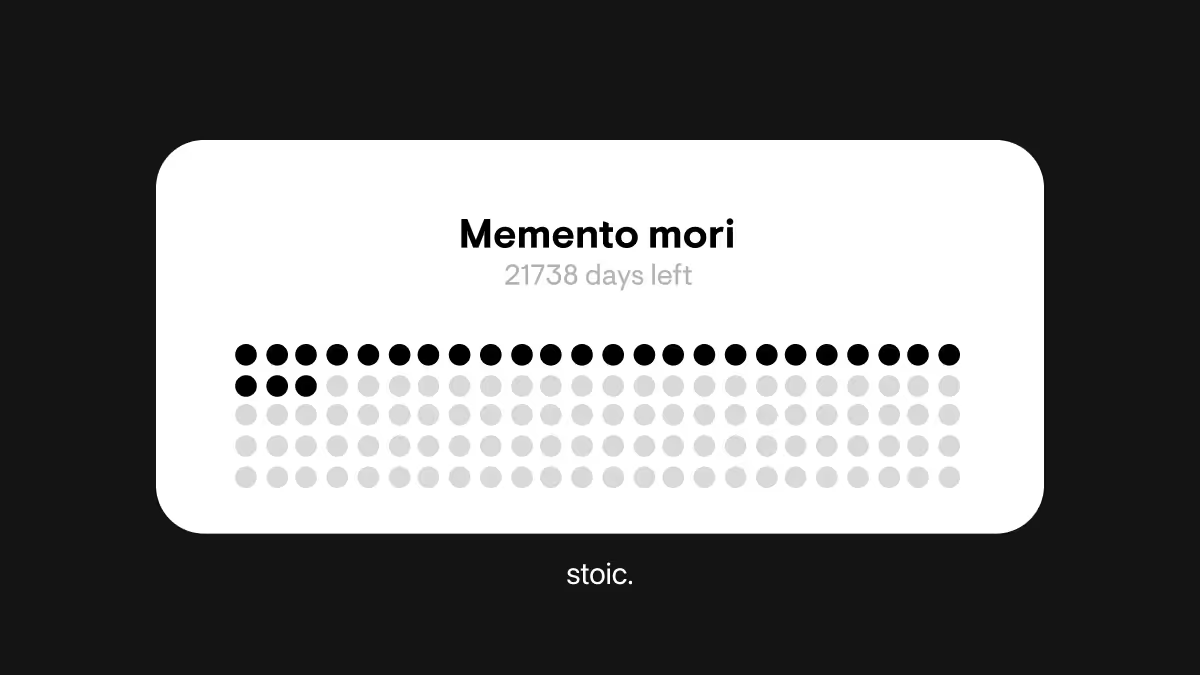What is Memento Mori? A Stoic Reflection on Life and Death
Explore the concept of Memento Mori in Stoicism and discover how reflecting on our mortality can inspire a more meaningful, fulfilled life.
Updated on
June 5, 2025

Memento Mori, a Latin phrase meaning “remember you must die,” is a powerful concept embedded in Stoicism, urging people to reflect on their mortality. This reflection isn’t meant to evoke fear or sadness but to inspire individuals to live more fully, authentically, and mindfully, considering that life is finite. In this post, we will explore the essence of Memento Mori, its connection to Stoicism, its practical implications for our everyday lives, and how you can practice it in your daily life with the stoic app.
Historical Context
Memento Mori has its roots in ancient Rome. It served as a reminder to generals and high-ranking officials, who, despite their victories and accolades, we're still mortal. The phrase became interwoven with Stoicism, a philosophy that teaches the development of virtue and wisdom as a means to achieve true happiness. For Stoics, acknowledging and accepting the inevitability of death is crucial to living a life of purpose and meaning.
Memento Mori and Stoicism
In Stoicism, Memento Mori serves as a tool to cultivate a balanced perspective on life. The Stoics believed in focusing on what's within our control and accepting what is not, including death. By regularly reflecting on our mortality, we can diminish the impact of external circumstances and prioritize our actions and thoughts around what truly matters.
Seneca, a prominent Stoic philosopher, wrote:
Let us prepare our minds as if we’d come to the very end of life. Let us postpone nothing. Let us balance life’s books each day…The one who puts the finishing touches on their life each day is never short of time.
Practical Implications of Memento Mori
- Live Mindfully and Authentically:
By contemplating our mortality, we are prompted to live more authentically and to prioritize our true values and desires over societal expectations and superficial pursuits.
- Prioritize What Truly Matters:
Understanding the transient nature of life enables us to focus on what is genuinely important, like relationships, personal growth, and contributing to the well-being of others.
- Enhance Gratitude and Appreciation:
Reflecting on the finite nature of life fosters a greater appreciation for the present moment and the people and experiences in our lives.
How to Practice Memento Mori

- Regular Reflection:
Set aside time regularly to reflect on your mortality and life’s impermanence. This can be done through meditation, journaling, or simple contemplation.
- Visual Reminders:
Keep visual reminders, such as our Memento Mori widget around you to foster regular contemplation on life and death.
- Live Intentionally:
Use the awareness of mortality to live according to your values, make meaningful choices, and avoid procrastination.
Memento Mori, “remember you must die,” is not a morbid or pessimistic reflection but rather a transformative Stoic principle aimed at inspiring a life of purpose, authenticity, and gratitude. By embracing our mortality, we can break free from trivial concerns and societal pressures, allowing us to focus on our true values and live a more fulfilled and meaningful life.
Embrace the profound wisdom of Memento Mori and let it be a constant reminder to live fully, every day. With the stoic app, not only can you delve deeper into the world of Stoicism and its practical applications, but you can also utilize the Memento Mori calendar widget. Enter your birthday, and the app will display a countdown of your age on a calendar set to 80 years, offering a vivid, daily reminder of life’s fleeting nature. It’s time to embrace the transient beauty of life, cultivate gratitude, and focus on what truly matters.
Frequently Asked Questions
Ready to start your journey towards a more mindful, fulfilled existence?
Get the Memento Mori widget in stoic ↓




